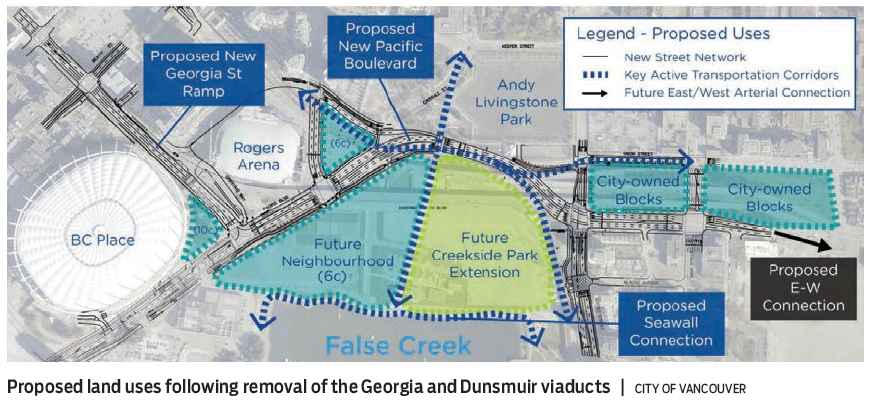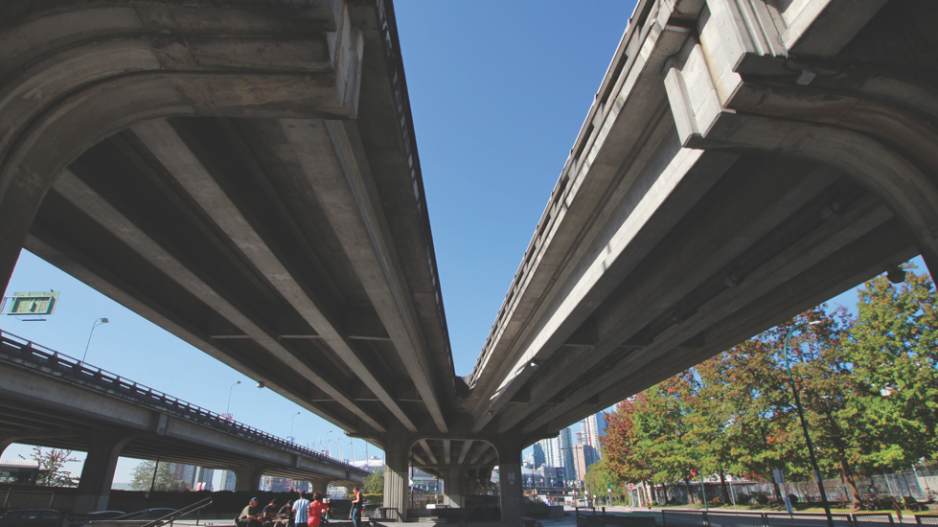An 18-month negotiation process is underway as city staff work with landowners to prepare the ground for removing the Georgia and Dunsmuir street viaducts connecting downtown to East Vancouver.
Vancouver council endorsed a staff report recommending removal of the viaducts on October 27, but before demolition begins the city needs to build bridges with the province, BC Pavilion Corp. (PavCo), Concord Pacific Developments Inc. and Aquilini Investment Group.
“Prior to any future rezonings within this area, significant issues must be addressed with the landowners and the province,” observed the staff report that council endorsed. “Staff will be undertaking extensive negotiations with the landowners and the province over the coming year related to these matters.”
The city owns two key blocks where the viaducts touch down on the False Creek Flats, but three other parcels the viaducts transect are in the hands of PavCo, Concord Pacific and Aquilini.
The negotiations will play a critical role in facilitating the viaducts’ removal, building the new road network to provide continued access to downtown and financing projected costs of between $180 million and $200 million.
To date, negotiations with landowners have largely taken a back seat to impacts on the cityscape and the social aspects of the initiative. But Jerry Dobrovolny, transportation director for the City of Vancouver, said the negotiations will be front and centre for staff in the coming months.
“Changes need to be made in order to secure the right-of-way that’s needed, and also in that process, changes will be made to free up right-of-way or land that’s no longer needed,” Dobrovolny said. “We own a bunch of land that we’re not going to need for road purposes or city purposes, given this reconfiguration, and … that land becomes part of the negotiations with neighbouring landowners.”
Two parcels, known as 6C and 10C and controlled by Concord Pacific and PavCo, respectively, will be pivotal in the discussions. The realignment of road networks will boost the development capacity of the sites, but also limit the owners’ opportunities.
PavCo, which operates BC Place, has told Business in Vancouver that any realignment of the road network must not hurt its ability to develop its parcel, including remediation of soils contaminated by the existing viaducts.
The new road network, including a ramp connecting Georgia Street to Pacific Boulevard, will affect loading docks for BC Place. The ramp will pass over a parkade associated with a 30-storey tower proposed for the corner of Georgia and Pacific.

Concord Pacific’s holdings on parcel 6C, meanwhile, will be pared by 0.06 acres (about 2,615 square feet) when the viaducts come down, but the parcel will gain 3.3 acres of city-owned land for development of up to 2.5 million square feet (including 220,000 square feet of commercial space).
Whether the city sells the land to Concord Pacific with consideration for the portion lost, negotiates a deal around community amenity contributions or density or mandates public amenities on the site in exchange for the land is an open question.
Dobrovolny will only say, “We’ve had good productive meetings with all the property owners.”
However, with development sites in adjacent areas trading at $100 to $150 per buildable square foot, the negotiations mean millions of dollars are at stake as the city pencils in the details of the viaducts’ removal.
Concord Pacific did not respond to a request for comment, and most observers – citing the complex and unique nature of the site – wouldn’t venture a comment on the value at stake.
David Negrin, president of Aquilini Development and Construction Inc., is confident any cost to landowners will be more than repaid in future development – and he expects that’s where city coffers will benefit the most, too.
“The city has stated that the majority of costs in terms of demolition can be recovered by density from future rezonings,” he said. “[But] the demolition of the viaducts is beneficial to everyone. Demolition will open up the ground plane of the neighbourhood and create more park space and housing for the central core of Vancouver.” •




